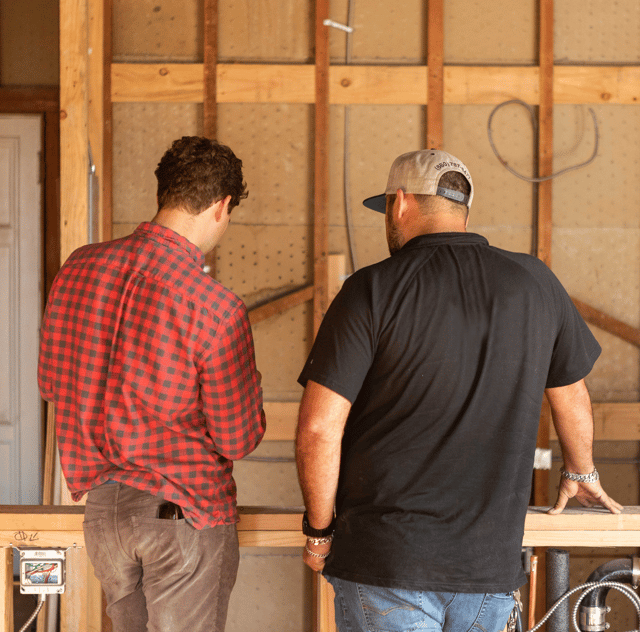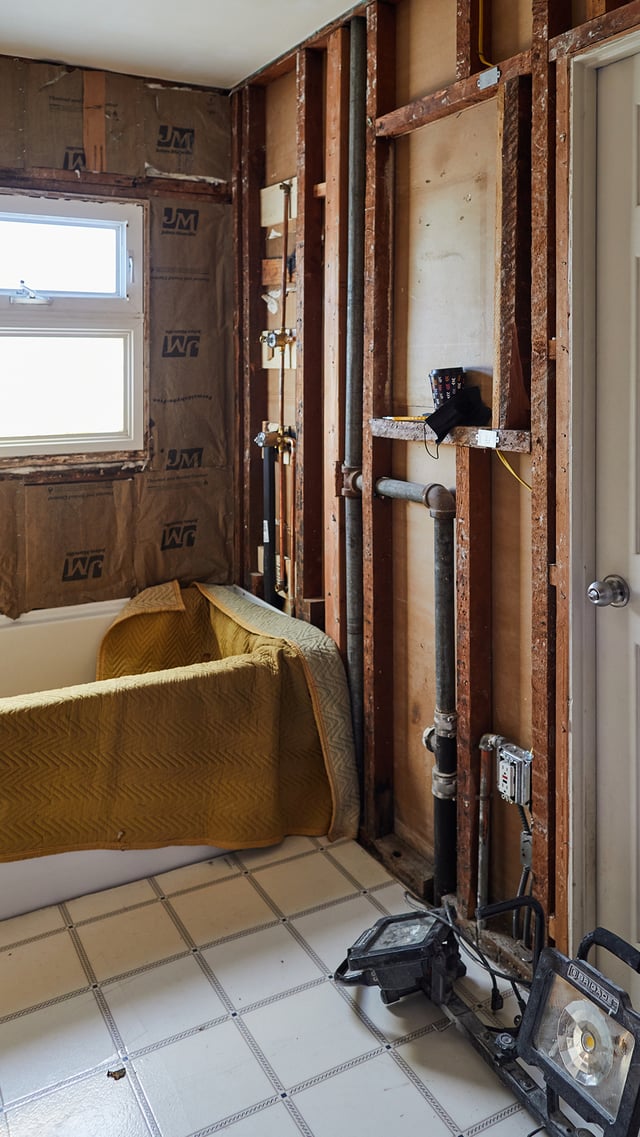
Working with Contractors
The Block Way of Renovating: A Complete Homeowner’s Guide
11.24.2025


In This Article
Starting a home renovation can feel like going on a big adventure. But before any hammers start swinging, you need a plan, just like a treasure map.
This plan is called a general contractor agreement. It's important because it tells everyone what to do and when. Without it, things might go wrong, like unexpected bills or unfinished work.
In this guide, we’ll talk about what you should look for in this agreement to keep everything on track and protect you from surprises. Let’s dive in and learn together!
A general contractor agreement is like a guidebook for your home renovation project. It’s a written document that details everything about the renovation, ensuring that all parties know what to expect. This agreement lists out what work will be done, who will be responsible for each task, and how much the entire project will cost. It's essentially a big promise that everyone working on your home, including you, is agreeing to follow. By having this guide in place, both you and your contractor can avoid confusion and keep the project running smoothly, minimizing surprises and misunderstandings.
In the renovation process, this agreement acts as a crucial roadmap. It shows the responsibilities of key people involved, such as the homeowner, contractor, and sometimes subcontractors. Each plays a vital role in making sure the project is successful. Here's how everyone fits in:
When putting a renovation plan together, it's crucial to include the essential elements of a general contractor agreement. These elements ensure that everyone knows their roles, responsibilities, and what is expected. By clearly outlining these details, you protect yourself and help keep the project on track.
The scope of work is like a to-do list for your renovation project. It provides a detailed description of what the contractor will do. This part of the agreement should cover all aspects of the work, from start to finish, leaving no room for guessing. A clear scope ensures that everyone is on the same page and knows exactly what needs to be done. This helps avoid misunderstandings about what is included in the project.
Additionally, the scope of work sets specific deliverables and timeline expectations. This means it outlines what will be completed and by when. For example, it might say that painting the walls should be done within two weeks or installing new floors will take one month. Having these specifics in place helps keep the project on schedule and allows you to track progress. Here’s a simple example in table form to make things clearer:
|
Task
|
Deliverable
|
Expected Completion Time
|
|
Paint Living Room
|
Walls painted
|
2 Weeks
|
|
Install New Flooring
|
Hardwood floors
|
1 Month
|
|
Update Kitchen Tiles
|
New tiles installed
|
3 Weeks
|
This table shows how clear details make it easier for everyone to understand what needs doing and when it should be done.
Payment terms in a general contractor agreement outline how much the entire project will cost and when payments should be made. The agreement should state the total project cost clearly, so there are no surprises. It also typically includes a payment schedule, which breaks down when and how much you need to pay at each stage of the project. This helps in planning your budget and ensures that everyone knows when payments are due.
Additionally, payment terms address advance payments, milestone payments, and the final payment. An advance payment might be required to kickstart the renovation, while milestone payments are made after reaching specific stages of the project, like when the kitchen is fully painted or the flooring is installed. The final payment is usually made once the entire project is complete and you’re satisfied with the work.
It’s also important that the agreement covers unexpected costs and change orders. This means if any surprises pop up or if you decide to make changes to the plan, there should be a clear process for adjusting costs and making payments. Understanding these terms up front helps protect your finances and keeps the project moving smoothly.
The project timeline in a general contractor agreement lays out the start and completion dates for your renovation. It's like a calendar that shows when work begins and when it should end. By having these dates clearly specified, you can manage your expectations and plan around the renovation activities better. It also keeps everyone accountable, ensuring that the contractor sticks to the agreed schedule without unnecessary delays.
Moreover, the timeline section often includes penalties for delays and incentives for early completion. Penalties might be applied if the project drags on past the agreed completion date, which can help ensure that the contractor stays motivated to finish on time. On the flip side, incentives for early completion encourage the contractor to finish the work ahead of schedule, potentially rewarding them for efficiency. These elements help create a fair balance, motivating timely completion while considering any challenges that might arise.
When it comes to materials and equipment, the general contractor agreement should clearly outline the quality and specifications of the materials to be used in your renovation. This means detailing exactly what types of materials will be utilized, such as the brand, quality level, and specific features. Clear descriptions ensure that both you and the contractor have the same vision for how the finished project should look and function, preventing any misunderstandings about what is expected regarding material quality.
Additionally, the agreement should specify who is responsible for procuring and storing these materials. Typically, the contractor handles buying the necessary materials and ensuring they are stored safely until needed. This helps streamline the process, ensuring that all needed materials are available when work begins. Clearly designating this responsibility in the agreement avoids confusion and ensures the renovation proceeds without unnecessary interruptions due to missing or mishandled materials.
In any renovation project, permits and approvals play a crucial role, making sure everything complies with local laws and codes. The general contractor agreement should clearly state who is responsible for obtaining these necessary permits. Usually, it’s the contractor’s responsibility to handle the paperwork and secure all required permits before starting the work. This helps ensure that the project progresses smoothly and legally without any hitches from local authorities.
Failing to comply with local regulations can lead to significant consequences. These might include fines, project delays, or even having to undo completed work. By having a clear outline in the agreement, it reduces the risk of such issues, keeping everyone on the same page about what needs to be done legally. This ensures your renovation aligns with all local rules, providing peace of mind and protecting your investment from potential legal headaches.
Insurance and liability are critical factors in a general contractor agreement to protect both you and the contractor during the renovation. The agreement should require proof of the contractor’s insurance, such as general liability and worker’s compensation. General liability insurance covers any damage that might happen to your property during the renovation, while worker’s compensation protects workers in case of injuries. This proof ensures that you won’t be financially liable if anything goes wrong during the project.
Additionally, the agreement should include clauses that address what happens if there is damage to your property or if third-party claims arise. These clauses clearly define who is responsible for what in case any accidents occur or unexpected issues pop up, like a neighbor's property being affected. By having these details nailed down in the agreement, you are safeguarded against unforeseen expenses and complications, providing a layer of security throughout the renovation process.
Dispute resolution is an important part of a general contractor agreement, providing a clear path for solving any disagreements that might arise during your renovation. The agreement should outline the steps to be taken if disputes occur, such as using mediation or arbitration before jumping to legal action. Mediation involves a neutral third party helping to find a solution, while arbitration is a more formal process where an arbitrator makes a binding decision. These steps can help resolve issues quickly and fairly without lengthy court battles.
Furthermore, the agreement should specify the governing law and jurisdiction, meaning which state or area’s laws will apply and where any legal actions would take place if necessary. This is important for both parties to understand, as it dictates the legal framework and processes that will be followed. Knowing the laws that apply and where disputes will be handled helps ensure clarity and preparedness, allowing both you and the contractor to approach any potential issues with a clear understanding of the process.
The termination clause in a general contractor agreement outlines the conditions under which either party can end the contract. This is important to protect both you and the contractor if things aren't working out as planned or if unforeseen circumstances arise. The agreement should clearly state situations like non-performance, breach of contract, or mutual agreement as valid reasons for termination.
In addition to the conditions, the termination clause should address the financial implications of ending the agreement. This includes what payments are due, any penalties, or refunds that should be issued when the contract is terminated. By specifying these details, you help ensure a smooth and fair resolution if either party decides to exit the contract, minimizing financial surprises and legal issues.
Warranties and guarantees play a key role in a general contractor agreement, providing peace of mind about the quality of work and materials used. The contractor’s warranty on workmanship covers the quality and reliability of the work performed, promising to fix any issues related to how the job was done within a certain timeframe. This assures you that the contractor stands by their work and will address any problems that arise from poor workmanship.
Additionally, the agreement should mention manufacturer warranties on materials and appliances used in the renovation. These warranties ensure that if any product fails or has defects, you can have it repaired or replaced according to the manufacturer’s terms. By having these warranties and guarantees clearly specified, you secure protection for both the craftsmanship and the materials, safeguarding your home renovation investment.
When reviewing a general contractor agreement, it's essential to be aware of potential red flags that could cause trouble down the line. These warning signs indicate areas that might lead to problems, misunderstandings, or financial issues if not addressed early on. By spotting and resolving these red flags upfront, you can ensure a smoother, more secure renovation experience.
Be cautious if you come across unclear or vague language in the agreement, as this can lead to confusion or disputes later on. Here are some examples to watch out for:
By ensuring these sections are clearly detailed, you help avoid misunderstandings and ensure everyone knows exactly what is expected.
Having complete insurance documentation in a general contractor agreement is crucial for protecting both you and the contractor. If insurance papers are missing, it raises immediate concerns about who will be liable for accidents or damages occurring during the renovation. It's essential to ensure the contractor provides proof of insurance, such as general liability or worker’s compensation, as part of the agreement.
Without this documentation, you could be left vulnerable to unexpected costs if something goes wrong, like a worker getting injured or property damage. Always ask for these documents upfront to verify the contractor's coverage, ensuring that any potential risks are adequately managed. This step helps provide peace of mind and secures your financial safety throughout the renovation process.
An absence of penalties for project delays in a contractor agreement can be a significant red flag. If there are no consequences for not finishing on time, the contractor might not feel pressured to meet deadlines, which could lead to extended timelines and inconvenience for you. Ensuring that the agreement includes penalties for delays encourages the contractor to complete the work as scheduled.
Without such penalties, you might face prolonged renovations, disrupting your daily life and possibly increasing costs. Including clear terms for penalties ensures that both parties are committed to a timely completion, helping keep the project on track and reducing the likelihood of unnecessary delays.
Watch out for agreements that demand excessively high deposits or large upfront payments, as these can be signs of potential issues. Typically, a reasonable deposit should be a small percentage of the total project cost—usually around 10-20%. Demanding a large sum before any work begins might indicate financial insecurity or an attempt to collect money without delivering on promises.
Large upfront payments can leave you vulnerable, as there’s less incentive for the contractor to follow through efficiently once the funds are received. It's vital to ensure that payment schedules are tied to project milestones and progress. This approach helps ensure that you are only paying for work that has been completed to your satisfaction.
A general contractor agreement should clearly outline how disputes will be handled, ensuring that both parties have a fair and structured process for resolving conflicts. If these details are missing, it can lead to confusion and prolonged disagreements when issues arise. An agreement lacking dispute resolution terms might leave you without a clear path to address and settle disagreements efficiently.
Having specific steps for mediation or arbitration, for example, helps ensure disputes are resolved calmly without resorting to lengthy legal battles. By defining these processes upfront, you secure a straightforward method for handling any disagreements, keeping the renovation project moving smoothly and minimizing stress for everyone involved.
When diving into a renovation project, it's important for homeowners to be well-prepared and informed. Understanding the ins and outs of your contractor agreement is crucial for protecting your interests and ensuring a successful renovation. Here are some key tips to help you navigate the process smoothly and confidently.
Before signing a general contractor agreement, take the time to review it carefully, ensuring you understand every part. If anything seems unclear or complex, don't hesitate to consult a legal professional who can provide guidance and clarification. It’s important that every clause is clear, so you know exactly what you’re agreeing to and can confidently move forward with your renovation.
Remember that the contractor agreement is not set in stone, and you have the right to negotiate terms that better protect your interests. If you find any part of the agreement that doesn't sit well with you, bring it up with your contractor and discuss possible changes. Don’t hesitate to ask for adjustments to ensure the agreement aligns with your expectations and provides you with the security you need throughout the renovation process.
Before committing to a contractor, it's crucial to verify their credentials to ensure you're hiring a trustworthy professional. Start by checking references to hear from other homeowners about their experiences with the contractor. Additionally, examine their licenses and review past work to confirm they have the necessary skills and legal approval to handle your renovation project safely and efficiently.
When it comes to your renovation project, make sure that all agreements and promises are documented in writing. Written contracts provide a clear reference that both you and the contractor can rely on, reducing the risk of misunderstandings or forgotten promises. Avoid relying on verbal agreements, as these can lead to disputes later on; instead, ensure that every detail discussed is included in the formal written contract for clarity and protection.
When dealing with general contractor agreements, homeowners often have several common questions. These queries usually revolve around the contract's terms, how to handle potential issues, and what to expect throughout the renovation process. Here, we'll address some of the most frequently asked questions to help you better understand and navigate your agreement.
If the contractor doesn't finish the project on time, it's important to refer to the terms outlined in your agreement regarding delays. Many agreements include penalties for late completion, which might involve financial deductions or extended deadlines at no extra cost. Discussing these scenarios beforehand ensures you know what steps to take to address delays and keep the project on track.
Terminating the contract mid-project is possible, but it depends on the conditions outlined in the termination clause of your agreement. This clause should specify the circumstances under which either party can end the contract, such as non-performance or breach of terms. If you’re considering this step, it’s wise to review these conditions carefully and consult with a legal professional to understand any financial or legal implications.
Handling disagreements over change orders starts with referring to the process outlined in your contractor agreement. The agreement should detail how change orders are to be requested, approved, and implemented, helping to manage any additional costs or timeline adjustments. Clear communication with your contractor and ensuring that every change is documented can prevent misunderstandings and resolve disagreements smoothly.
Yes, it is quite common for contractors to include an arbitration clause in the agreement as a way to handle disputes. Arbitration offers a more streamlined and less formal way of resolving disagreements than going through court, often saving time and costs. Including such clauses ensures there’s a clear plan for dispute resolution, providing both parties with a fair method to address conflicts.
In conclusion, having a detailed and fair contractor agreement is vital for a successful renovation, as it sets clear expectations and protects your interests. Take the time to thoroughly review and negotiate terms to ensure you're comfortable and informed before starting your project. For expert guidance on home renovations and navigating contractor agreements, consider reaching out to Block Renovation to help make your renovation journey as smooth as possible.

Written by Block Renovation
What should a homeowner do if a contractor refuses to provide a written agreement?
How much deposit is reasonable to pay upfront for a general contractor?
What are common disputes that arise in contractor agreements, and how can they be avoided?
How can homeowners verify if a contractor has the proper insurance coverage?
Is it necessary to involve a lawyer when reviewing a general contractor agreement?

Renovate confidently with Block
Easily compare quotes from top quality contractors, and get peace of mind with warranty & price protections.
Thousands of homeowners have renovated with Block

4.5 Stars (100+)

4.7 Stars (100+)

4.5 Stars (75+)

Working with Contractors
The Block Way of Renovating: A Complete Homeowner’s Guide
11.24.2025

Working with Contractors
Steps to Vetting a General Contractor
11.04.2025

Contractors
Half Bathroom to Full Conversion: Costs, Permits & Designs
08.02.2025

Process
Gutting a Bathroom: What It Entails, Costs & Timeline
07.15.2025

Remodeling
Does Homeowners Insurance Cover Renovations?
05.22.2025
Renovate confidently